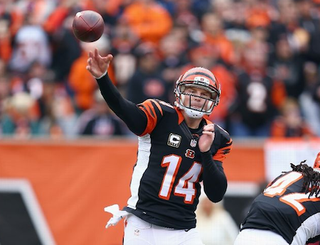Cincinnati Sells Out: Blackout Threat Over

Sports fan crisis averted. The Cincinnati Bengals have sold out their remaining tickets to the NFL wild card game the team is hosting this weekend.
The NFL had given extensions to three of the four home teams in the first round playoff—Cincinnati, Indianapolis and Green Bay—after the games had not sold out by 72 hours before kickoff. By NFL rules, those games have to be blacked out on TV in their home markets.
They had until 4 p.m. Friday. Both the Colts and the Packers announced Friday they had sold out after local businesses stepped in to buy up the remaining tickets for military families.
The Bengals also eventually filled all the seats, with help from the Cincinnati division of Kroger's, which bought up a lot of the remaining tickets Friday, followed a final buy from P&G brands Tide, Gillette, CoverGirl and Bounty, which put the effort in the "end zone," the team said on its Web site.
The league had said it would not waive the blackout if a team does not fill the seats.
The last playoff blackout was in 2002.
David Goodfriend, chairman of the Sports Fans Coalition, which petitioned the FCC to eliminate the rules, was not happy with the last-minute maneuvering to fill the seats.
Broadcasting & Cable Newsletter
The smarter way to stay on top of broadcasting and cable industry. Sign up below
“The last few days leading up to this weekend’s NFL playoffs revealed the arbitrary and spiteful nature of the NFL’s local blackout policy and why it’s time to end the government’s support of anti-fan blackouts," he told B&C. "First, the league jacks up playoff ticket prices, making it difficult for every-day Americans to attend the games. Then, they threaten the hard-working communities of Cincinnati, Green Bay, and Indianapolis with a local blackout if the league’s ransom of a sellout crowd isn’t met. Then, they arbitrarily extend their sellout deadline to avoid embarrassment. Finally, some individual or company has to buy a block of over-priced tickets to create the illusion of a sellout."
(Photo Credit: Andy Lyons/Getty Images)
Contributing editor John Eggerton has been an editor and/or writer on media regulation, legislation and policy for over four decades, including covering the FCC, FTC, Congress, the major media trade associations, and the federal courts. In addition to Multichannel News and Broadcasting + Cable, his work has appeared in Radio World, TV Technology, TV Fax, This Week in Consumer Electronics, Variety and the Encyclopedia Britannica.

